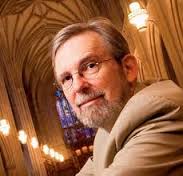One of the interesting questions raised by Richard’s approach to the reading of the OT is whether or not it is reasonable to assume that the various Gospel audiences had the requisite ‘encyclopedia of reception’ that he assumes they do, in order to catch the allusions and echoes of OT Scripture in various of the Gospel narratives. This question is especially pressing with a Gospel like Mark’s which has few overt citations of the OT unlike Matthew and does not use the fulfillment formula of Matthew. I must confess to having some doubts about the sophistication of Mark’s audience, and for that matter most of the Gospel writers’ audiences in an age where literacy level was perhaps 15% or so. But then perhaps one can argue that the literate lector, or reader of the Gospel to the intended audience could explain things that needed to be explained, which is probably what the phrase ‘let the reader (noting the Greek word is in the singular here i.e. the literate lector, not the audience in general) understand’.
At various points along the way in this book, one sees the influence of Tom Wright on Richard’s thinking when it comes to questions like is Israel still in exile when they are already in the Holy Land, or the question of the exegesis of Dan. 7.13-14 and Mk. 14.62. For the record, I entirely disagree with the notion that Jesus is referring to the enthronement of the Son of Man in his rebuttal to Caiaphas. No indeed, he is referring to the second coming, and similarly, the reference in Dan. 7.13-14 is not to the ascension of the Son of Man, but rather his descent on the clouds to judge the world, which is how Mk. 14.62 reads the text as well (but see pp. 18-19 for Richard’s take). If one actually examines the theophany texts in the OT, they are about God coming on the clouds to rescue or judge his people on earth. It is not about ascending into heaven. What then is the relationship between the Ancient of Days and the Son of Man? Richard speaks of the identity of the Son of Man with the God of Israel, I would prefer to talk about the unity of the two figures, both presented as divine, but the Son of Man is presented as both divine and human. In other words, it’s o.k. to say they share a divine nature, but this text is all about distinguishing them as persons.
Where Richard’s discussion is leading is to make clear that Mark is happy to use texts that in the OT are about Yahweh, the Lord God of Israel, to refer to Jesus. Jesus IS the kyrios of whom Isaiah and others speak. The question however, is HOW does Mark use the texts. Is he arguing implicitly for a shared identity between the Father and the Son, the divine identity, or is he suggesting a unity between the two who remain two, while sharing a divine nature and purpose? In other words, is Mark really wanting to say that Jesus is Yahweh? This seems most unlikely since, among other things Jesus prays to Yahweh, and hears from Yahweh at his baptism etc. He is not talking to himself. In other words, one needs a way of talking about Jesus that stresses the unity of the Son with the Father, but also their distinction as persons so that one does simply make the mistake ‘Jesus=Yahweh’. Does Jesus assume divine roles, privileges, activities, attributes. Yes he does, all of the above is true which is why it is correct to talk about ‘the elusiveness of the divine presence in Jesus’ (p. 25) or ‘God is strangely present in Jesus’ (p.26). Taking into account the apocalyptic qualities of Mark with its hidden and revealed themes, Hays may be right that the refusal to trumpet openly the secret of Jesus’ divinity the author is teaching his audience to ponder more, and listen more deeply before talking about such mysteries. I do find very interesting Richard’s reading of Jesus’ walking on water in light of Job 9 (pp. 24-25). The question which Richard raises on p. 27 is the right one— how can Jesus be both the God of Israel and at the same time a human being who can be distinguished from the God of Israel? The answer is– He is not simply ‘the God of Israel’. He shares the divine nature with the God of Israel, but he is the Son of the God of Israel. End of story. And the same applies at the other end of the spectrum. Jesus is not Israel. He is the representative of Israel which fulfills Israel’s mission, ministry, destiny to be a light to the nations and the redeemer of God’s chosen people as well. Here is not the place to talk about the deficiencies in Tom Wright’s views of Israel and Jesus and Israel. I’ve dealt with that at great length in last summer’s blog posts on Tom’s magnum opus.
I absolutely agree with Richard (p. 28), that unless one takes stock of not only the citations but the allusions to OT texts in Mark one will come up with a deficient view of Mark’s Christology. Richard makes a good deal out of Mk. 4.22 ‘things are hidden, in order that (hina clause) they may be revealed’ (to the appropriate people at the appropriate time) (p. 29). The hiddenness belongs to the revelatory purpose. Thus parables both proclaim a truth like a herald, but at the same time conceal a truth like an oracle (p. 30– quoting Kermode). But it is Jesus, not merely the kingdom that is the mystery in this Gospel meant to be hidden and revealed. Indeed, a kingdom implies of course a king and the question is— Who is he?
I think this is a fine chapter, full of helpful remarks about Mark’s Christology and use of Scripture, with the caveats mentioned above.













